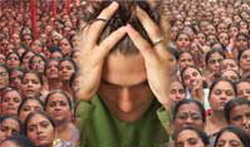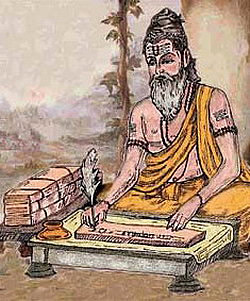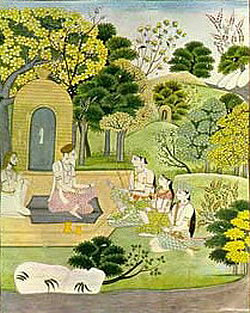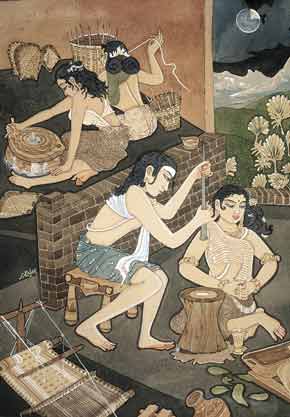When Sukulina and I took over our first congregation we moved into a tiny three bedroom bungalow on a very busy street with six small children. This tiny house was both our home and the temple. One bedroom became the temple office and another room, the living room, became the temple. We had little space for our family. And to make matters worse, every day, scores of people would visit our home/temple to pray or meditate, and on weekends there would be hundreds of people. Just imagine one bathroom, a family of six young children living in one room, and hundreds of guests! It was insanity. I ended up setting up a small tent trailer in the backyard as my room. I slept there alone in the winter and even during the rainy season.
small tent trailer in the backyard as my room. I slept there alone in the winter and even during the rainy season.
In time our small temple prospered and we moved to a bigger location. This time there was actually a separate building for the priest’s residence. Unfortunately, it was only ten meters from the temple building and so again we had little privacy. For years Sukulina had the public walking through her home to use the bathroom or to use the kitchen. We even had people walk into our bedroom to wake me to open the temple at 3:30 AM! We never had privacy.
 But my loss of privacy was still not the hardest part. As a priest I had to deal with unbelievable amounts of human suffering. This is something all priests have to face regardless of the religion. I had to deal with the pain of parents whose children were dying from terminal diseases. I had to face the grief of husbands as they cremated their wives. I have performed the funerals of teenagers who have committed suicide and for people who have been murdered. There is almost no end to the amount of human suffering that a priest sees. In the early years I did not shield myself from these terrible situations. I thought I must feel these people’s pain in order to console them. I had to learn the hard way. I did not understand that when I allowed this pain to enter my life it consumed me and became dangerous for me.
But my loss of privacy was still not the hardest part. As a priest I had to deal with unbelievable amounts of human suffering. This is something all priests have to face regardless of the religion. I had to deal with the pain of parents whose children were dying from terminal diseases. I had to face the grief of husbands as they cremated their wives. I have performed the funerals of teenagers who have committed suicide and for people who have been murdered. There is almost no end to the amount of human suffering that a priest sees. In the early years I did not shield myself from these terrible situations. I thought I must feel these people’s pain in order to console them. I had to learn the hard way. I did not understand that when I allowed this pain to enter my life it consumed me and became dangerous for me.
About a year after I became a priest I almost died. I suffered from a mysterious breakdown that the doctors still do not understand. I became paralyzed for almost four months. I could not sit up in bed, I could not walk, I could not raise my arms to feed myself, and I almost lost my ability to use my abdominal muscles. In other words, I almost lost my ability to breath. I came to within a hair’s breath of being put on a respirator. The doctors tested me for every conceivable disease, but could never make a diagnosis. I attribute this ailment to the huge stress that I underwent when I first came to this position. The enormity of learning the cultures, learning the pujas, the complete loss of personal privacy, and having to deal with the immensity of human suffering was an tremendous shock to my life. When I became a priest my life was turned inside out. My private life became public. I ceased to have a normal marriage or family life. My family became the world and I became public property. My private spiritual life became a subject of public discussion by literally thousands of people. Those who live “normal” lives have no idea how this feels. It has taken me years to cope. My family was also affected. At one point Sukulina even left me and ran away with the family and hid for weeks. I could not blame her. She tried to get me to stop being a priest, but I refused and I almost lost her. Today, the way that we live as a family is almost entirely based on our need to cope and manage our lives in the public spot light.
In these early days whenever I had any free time I would go for long walks just to find a few minutes of solitude away from the people. I used to get so “peopled out” that I would go almost mad. It was at this time that I became seriously ill. This became a life changing experience and I realized that if I was going to survive as a priest I would have to change the way I lived and thought. This is when I learned to compartmentalize my feelings and when I learned to take shelter of the desert. In the desert I could find solitude and privacy. Anna, the desert saved my life. My desert excursions eventually evolved into the desert property where I now live.


















 You have taken initiation? What did you just agree to? The four what? Regulative principles? Sixteen daily rounds of Japa? My God! Do you understand what you have done?
You have taken initiation? What did you just agree to? The four what? Regulative principles? Sixteen daily rounds of Japa? My God! Do you understand what you have done?